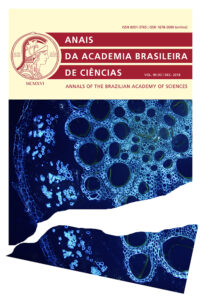By Alexander W. A. Kellner
What would you do if, as Editor of a scientific journal, you discovered that almost a quarter of the articles from a specific issue simply disappeared from the Journal Citation Reports (JCR) platform, in the same year that the new Impact Factor (IF) comes out?
This is exactly what happened during a survey on the contribution of Agrarian Sciences in the bibliometric indexes of the Anais da Academia Brasileira de Ciências (AABC). As generally known, the AABC is the only scientific journal published in Brazil considered as multidisciplinary in the broadest sense of the term, publishing from discoveries of new and extinct species to studies on social issues of indigenous populations, including articles on mathematical, chemical and biomedical sciences – just to highlight some areas. At a certain point, there was a very large increase in the number of submission of manuscripts focused on Agrarian Sciences in AABC, perhaps a consequence of “Qualisitis” (this is another story, see the editorial note The Qualis system: a perspective from a multidisciplinary journal1). The purse of the survey was to get a general idea how this increase was reflected in the journal’s indexes based on a volume that randomly gathered articles from this area.
What was our surprise to discover that, of the 64 published articles, 15 simply were not listed in the 2019 edition of JCR, which has just been published? And the worst: these 15 articles were also missing from Web of Science (WoS). This is the second time that the AABC has had to face this situation. When articles “disappear” from the JCR, it means that they have not been counted in the journal’s IF calculation. But when they disappear from the WoS, they also stop counting for the authors’ performance metrics, such as the h-index! On the previous occasion, after many complains, we managed to get the articles back on WoS, but not on the JCR, which penalized the journal (A closer look at the Impact Factor (JCR 2012): problems, concerns and actions needed2). A Kafkaesque feeling in the purest sense of expression for any Editor…
However, in the “bakery effect” world, in which the indices are here to stay (e.g., Compendium of Bibliometric Science Indicators3), publishers need to adapt. We have, thus, created a new index – MAI, Missing Article Index – which seeks to evaluate the effect of non-citation to a scientific journal. It was not something that had been planned, but the point is that the exclusion of articles in JCR is real, has negative effects on the journal’s performance, and should be further investigated (Development of Agrarian Sciences at the AABC with comments on impact and performance evaluations4).
In the analysis4, some procedures are presented that may assist in the evaluation of the contribution of specific themes or volumes to the bibliometric indexes of a given journal.
Notes
1. KELLNER, A.W.A. The Qualis system: a perspective from a multidisciplinary journal. An Acad Bras Cienc [online]. 2017, vol. 89, no. 3, pp. 1339-1342, ISSN: 1678-2690 [viewed 5 August 2020]. DOI: 10.1590/0001-37652017893. Available from: http://ref.scielo.org/dk3vt5
2. KELLNER, A.W.A. and AZEVEDO, R.A. A closer look at the Impact Factor (JCR 2012): problems, concerns and actions needed. An Acad Bras Cienc [online]. 2013, vol. 85, no. 3, pp. 859-862, ISSN: 1678-2690 [viewed 5 August 2020]. DOI: 10.1590/S0001-37652013000300001. Available from: http://ref.scielo.org/28yhx6
3. OECD and SCIMAGO RESEARCH GROUP (CSIC). Compendium of Bibliometric Science Indicators [online]. OEC. 2016 [viewed 5 August 2020]. Available from: http://www.oecd.org/sti/inno/Bibliometrics-Compendium.pdf
4. KELLNER, A.W.A. Development of Agrarian Sciences at the AABC with comments on impact and performance evaluations. An Acad Bras Cienc [online]. 2020, vol. 92, suppl. 1, e202092S1, ISSN: 1678-2690 [viewed 5 August 2020]. DOI: 10.1590/0001-3765202092S1. Available from: http://ref.scielo.org/8md682
References
KELLNER, A.W.A. and AZEVEDO, R.A. A closer look at the Impact Factor (JCR 2012): problems, concerns and actions needed. An Acad Bras Cienc [online]. 2013, vol. 85, no. 3, pp. 859-862, ISSN: 1678-2690 [viewed 5 August 2020]. DOI: 10.1590/S0001-37652013000300001. Available from: http://ref.scielo.org/28yhx6
KELLNER, A.W.A. and PONCIANO, L.C.M.O. H-index in the Brazilian Academy of Sciences – comments and concerns. An Acad Bras Cienc [online]. 2008, vol. 80, no. 4, pp. 771-781, ISSN: 1678-2690 [viewed 5 August 2020]. DOI: 10.1590/S0001-37652008000400016. Available from: http://ref.scielo.org/3m8xzr
KELLNER, A.W.A. Development of Agrarian Sciences at the AABC with comments on impact and performance evaluations. An Acad Bras Cienc [online]. 2020, vol. 92, suppl. 1, e202092S1, ISSN: 1678-2690 [viewed 5 August 2020]. DOI: 10.1590/0001-3765202092S1. Available from: http://ref.scielo.org/8md682
KELLNER, A.W.A. The Qualis system: a perspective from a multidisciplinary journal. An Acad Bras Cienc [online]. 2017, vol. 89, no. 3, pp. 1339-1342, ISSN: 1678-2690 [viewed 5 August 2020]. DOI: 10.1590/0001-37652017893. Available from: http://ref.scielo.org/dk3vt5
OECD and SCIMAGO RESEARCH GROUP (CSIC). Compendium of Bibliometric Science Indicators [online]. OEC. 2016 [viewed 5 August 2020]. Available from: http://www.oecd.org/sti/inno/Bibliometrics-Compendium.pdf
External links
Anais da Academia Brasileira de Ciências – AABC <http://www.scielo.br/aabc>
About Alexander W.A. Kellner
Full Professor and member of the Academia Brasileira de Ciências, he is Editor-in-Chief of AABC. He holds a doctorate from Columbia University (New York) and works at the Museu Nacional-UFRJ, for which he was elected director (2018-2022). His research interests include Paleontology, especially the evolution and diversification of fossil reptiles, mainly dinosaurs and pterosaurs (winged vertebrates). Besides several Brazilian regions, he carried out field activities in countries such as Antarctica, Iran, China, Argentina and Chile.
Translated from the original in Portuguese by Lilian Nassi-Calò.
Como citar este post [ISO 690/2010]:













Recent Comments